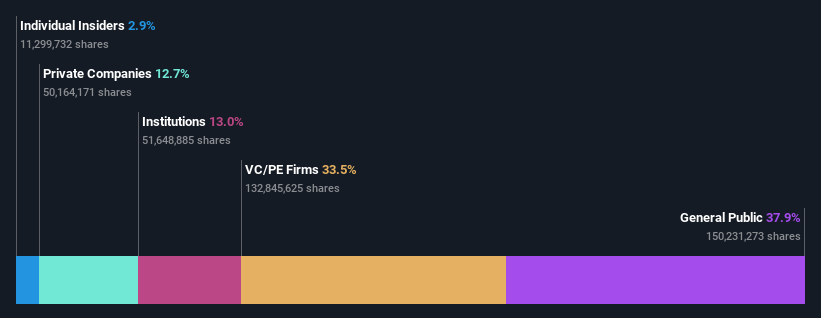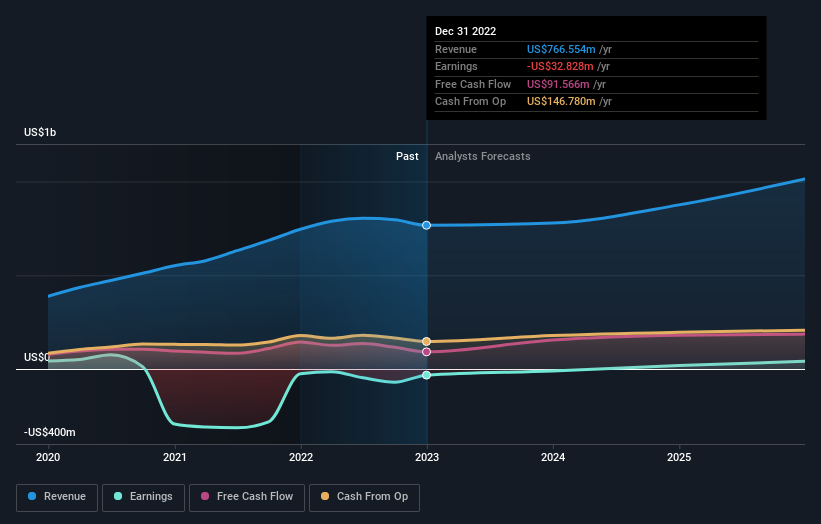- United States
- /
- Healthtech
- /
- NasdaqGS:GDRX
GoodRx Holdings, Inc.'s (NASDAQ:GDRX) largest shareholders are retail investors who were rewarded as market cap surged US$75m last week

Key Insights
- GoodRx Holdings' significant retail investors ownership suggests that the key decisions are influenced by shareholders from the larger public
- 50% of the business is held by the top 6 shareholders
- 13% of GoodRx Holdings is held by Institutions
To get a sense of who is truly in control of GoodRx Holdings, Inc. (NASDAQ:GDRX), it is important to understand the ownership structure of the business. With 38% stake, retail investors possess the maximum shares in the company. Put another way, the group faces the maximum upside potential (or downside risk).
As a result, retail investors collectively scored the highest last week as the company hit US$2.2b market cap following a 3.6% gain in the stock.
In the chart below, we zoom in on the different ownership groups of GoodRx Holdings.
View our latest analysis for GoodRx Holdings

What Does The Institutional Ownership Tell Us About GoodRx Holdings?
Institutional investors commonly compare their own returns to the returns of a commonly followed index. So they generally do consider buying larger companies that are included in the relevant benchmark index.
As you can see, institutional investors have a fair amount of stake in GoodRx Holdings. This implies the analysts working for those institutions have looked at the stock and they like it. But just like anyone else, they could be wrong. If multiple institutions change their view on a stock at the same time, you could see the share price drop fast. It's therefore worth looking at GoodRx Holdings' earnings history below. Of course, the future is what really matters.

GoodRx Holdings is not owned by hedge funds. Francisco Partners Management, L.P. is currently the largest shareholder, with 21% of shares outstanding. Meanwhile, the second and third largest shareholders, hold 13% and 12%, of the shares outstanding, respectively. Additionally, the company's CEO Douglas Hirsch directly holds 1.0% of the total shares outstanding.
We did some more digging and found that 6 of the top shareholders account for roughly 50% of the register, implying that along with larger shareholders, there are a few smaller shareholders, thereby balancing out each others interests somewhat.
Researching institutional ownership is a good way to gauge and filter a stock's expected performance. The same can be achieved by studying analyst sentiments. Quite a few analysts cover the stock, so you could look into forecast growth quite easily.
Insider Ownership Of GoodRx Holdings
While the precise definition of an insider can be subjective, almost everyone considers board members to be insiders. Management ultimately answers to the board. However, it is not uncommon for managers to be executive board members, especially if they are a founder or the CEO.
I generally consider insider ownership to be a good thing. However, on some occasions it makes it more difficult for other shareholders to hold the board accountable for decisions.
We can see that insiders own shares in GoodRx Holdings, Inc.. This is a big company, so it is good to see this level of alignment. Insiders own US$62m worth of shares (at current prices). It is good to see this level of investment by insiders. You can check here to see if those insiders have been buying recently.
General Public Ownership
The general public-- including retail investors -- own 38% stake in the company, and hence can't easily be ignored. While this group can't necessarily call the shots, it can certainly have a real influence on how the company is run.
Private Equity Ownership
Private equity firms hold a 34% stake in GoodRx Holdings. This suggests they can be influential in key policy decisions. Some investors might be encouraged by this, since private equity are sometimes able to encourage strategies that help the market see the value in the company. Alternatively, those holders might be exiting the investment after taking it public.
Private Company Ownership
We can see that Private Companies own 13%, of the shares on issue. It might be worth looking deeper into this. If related parties, such as insiders, have an interest in one of these private companies, that should be disclosed in the annual report. Private companies may also have a strategic interest in the company.
Next Steps:
While it is well worth considering the different groups that own a company, there are other factors that are even more important.
I like to dive deeper into how a company has performed in the past. You can access this interactive graph of past earnings, revenue and cash flow, for free.
But ultimately it is the future, not the past, that will determine how well the owners of this business will do. Therefore we think it advisable to take a look at this free report showing whether analysts are predicting a brighter future.
NB: Figures in this article are calculated using data from the last twelve months, which refer to the 12-month period ending on the last date of the month the financial statement is dated. This may not be consistent with full year annual report figures.
New: Manage All Your Stock Portfolios in One Place
We've created the ultimate portfolio companion for stock investors, and it's free.
• Connect an unlimited number of Portfolios and see your total in one currency
• Be alerted to new Warning Signs or Risks via email or mobile
• Track the Fair Value of your stocks
Have feedback on this article? Concerned about the content? Get in touch with us directly. Alternatively, email editorial-team (at) simplywallst.com.
This article by Simply Wall St is general in nature. We provide commentary based on historical data and analyst forecasts only using an unbiased methodology and our articles are not intended to be financial advice. It does not constitute a recommendation to buy or sell any stock, and does not take account of your objectives, or your financial situation. We aim to bring you long-term focused analysis driven by fundamental data. Note that our analysis may not factor in the latest price-sensitive company announcements or qualitative material. Simply Wall St has no position in any stocks mentioned.
About NasdaqGS:GDRX
GoodRx Holdings
Offers information and tools that enable consumers to compare prices and save on their prescription drug purchases in the United States.
Flawless balance sheet and fair value.
Similar Companies
Market Insights
Community Narratives




